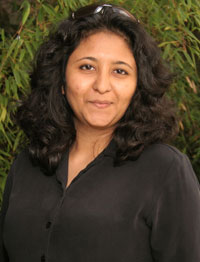
UC Merced physicist Sayantani Ghosh has been given a CAREER Award to further her research into the dynamics of 'exotic' magnets
- Physics Professor Sayantani Ghosh has been awarded the National Science Foundation's CAREER Award.
- The $450,000 award will support her research that provides insight into visualizing the dynamics of nanoscale magnetics.
- Ghosh is the sixth UC Merced faculty member — and the fourth physics professor — to win this award
MERCED, Calif. — University of California, Merced, physics Professor Sayantani Ghoshhas been awarded National Science Foundation's CAREER Award, the sixth campus faculty member to win the distinction in just four years.
“This award is a testament to the excellent research conducted by Professor Ghosh and an endorsement of all the work yet to come,” interim Dean of Natural Sciences Michael Colvin said. “She has made valued contributions to this campus, not only through research, but through teaching and mentoring students.”
The $450,000 award, spread over five years, will support Ghosh's innovative research, which provides insight into visualizing the dynamics of nanoscale magnetics. Ghosh will be studying geometrically frustrated magnetic systems through the use of magnetic and high-resolution optical techniques. Keeping with the campus' focus on interdisciplinary research, Ghosh will draw on techniques from optics, magnetism and low-temperature physics.
CAREER Awards, according to the NSF, “support junior faculty who exemplify the role of teacher-scholars through outstanding research, excellent education and the integration of education and research within the context of the mission of their organizations.”

In the context of physics, frustration describes a system that cannot settle into a minimum energy state because of some intrinsic property. It is comparable to trying to sleep but being compelled to drink coffee at the same time.
But while sleeping in a caffeinated state has almost no positive outcomes, Ghosh explained, in a frustrated magnetic system, novel phases appear that are unique to these systems. These are “exotic” (and messy) phases such as spin glasses, spin liquids, spin ice and others. Traditionally these systems have interested scientists because frustration governs processes in a wide variety of systems, such as protein folding and nanoclusters formation. If well understood, it will shed light across many disciplines.
For example, Ghosh plans on developing a new technique of measurement that will allow people to “look” into these materials. She will use ultrafast lasers to observe how these magnetic phases form, dissipate and re-form as external factors like temperature and fields are varied. One particular aspect she will focus on is investigating the formation of magnetic “protectorates” that are commonly found in frustrated magnets. A part of the system forms a little fortress around a cluster and protects it from fluctuations from the rest of the system. If properly controlled, these clusters may be used to encode information and frustrated magnets may be used as quantum information processing systems.
In addition to the research aspect, this award includes an educational component focused on mentoring women and minorities in science and engineering. To this end, Ghosh has founded the UC Merced Women in Science and Engineering (WiSE) group, which is focused on providing equal academic opportunities for female undergraduate and graduate students.
MEDIA CONTACT
Scott Hernandez-Jason






